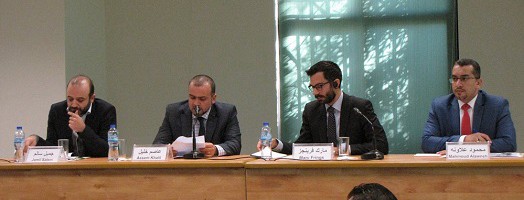The Legislative Process: Rethinking Policies for Legislation
Addressing the current context of the legislative process within the Palestinian legal system, the workshop discussed how to support a participatory approach in, enhance community oversight of, and develop the law making process. The event brought together Dr. Assem Khalil, Deputy President of the Birzeit University for Community Affairs, Marc Frings, Head of the Konrad Adenauer Stiftung Palestinian Territories, Dr. Jamil Salem, IoL Director, and Mr. Mahmoud Alawneh, Manager of the IoL Legislative Support Department. A number of professors and legal experts participated the workshop.
In his opening remarks, Mr. Alawneh stated that the legislative process in Palestine has been challenged by several problems and obstacles since the Ottoman period until the present day. These have resulted in an large body of legislation, which completely lacks regulations needed to govern functions of public institutions. Mr. Alawneh explained that the workshop would place a particular focus on a new type of research papers, which assist in the transition from theory to practice and pave the way to developing and promoting the oversight of a legislative plan.
Dr. Khalil asserted that the workshop was timely in light of the confusion that has affected the Legislative Authority following the internal Palestinian political split and Executive’s monopoly of the law-making process. Over protracted historical periods, the Legislative Authority was governed by different legal regimes, resulting in a plethora of political, social and economic predicaments. To this avail, the Palestinian Legislative Council took the initiative to integrate and consolidate regulations, but it has so far been in vain. Dr. Khalil wished that the workshop would contribute to devising effective and efficient solutions to put an end to this constant flux of Palestinian legislation.
Mr. Frings emphasised the importance of academic research, which should draw the future track of the Palestinian law-making process. He expressed his hope that the workshop would contribute to organising and helping to put the legislative process on the right track and to come up with practical solutions for relevant problems.
Dr. Salem reiterated that the legislative process was a key pillar of the state building process. In the Palestinian context, the legislative activity is all the more significant in light of a debilitated national sovereignty and entrenched legacy of the Israeli Occupying Power. Dr. Salem explained that the Palestinian context has been impaired by multiple divisions, which have allowed room for various regimes to control the Palestinian society. These have led to the emergence of elites with particular interests that further complicated the legislative and legal situation in Palestine.
The workshop comprised two sessions. Chaired by Mr. Fayez Bkirat, the first session was titled “Policy Papers: A New Approach for Reforming the Legislative Process”. The session included presentations by Ghassan Faramand, Ma’een al-Barghouthi, Mahmoud Alawneh, Alaa’ Hammad, and Razan al-Barghouthi. Speakers discussed the working relationship between the Palestine Liberation Organisation and Palestinian National Authority, integration of the regulatory impact assessment in the legal system, the current context and future scenarios of the functions performed by the Bureau of Legal Counsel and Legislation.
Titled “The Legislative Process and the State of Exception: Effective Oversight in the Face of the State of Exception”. Chaired by Dr. Mustafa Mar’i, the session included talks by Jihad Harb, Taher al-Massri, Raed Abdul Hamid, and Abdullah Nawahdah. Presentations addressed the state of exception in the Palestinian political system, the civil society’s role in legislative oversight, effective judicial control, and scope of litigation in constitutional challenges.






